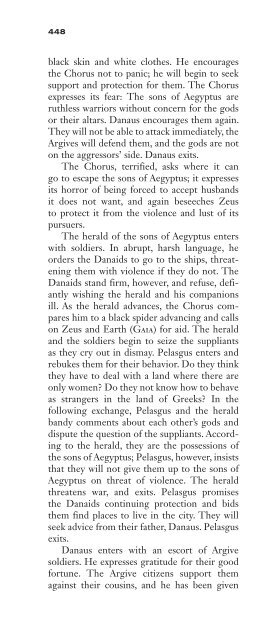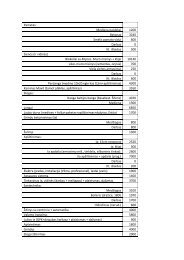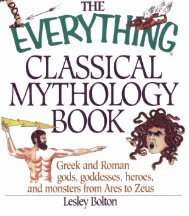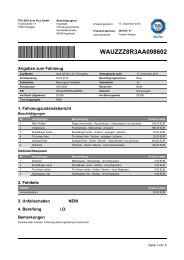Encyclopedia of Greek and Roman Mythology (Facts on File Library ...
Encyclopedia of Greek and Roman Mythology (Facts on File Library ...
Encyclopedia of Greek and Roman Mythology (Facts on File Library ...
Create successful ePaper yourself
Turn your PDF publications into a flip-book with our unique Google optimized e-Paper software.
lack skin <str<strong>on</strong>g>and</str<strong>on</strong>g> white clothes. He encourages<br />
the Chorus not to panic; he will begin to seek<br />
support <str<strong>on</strong>g>and</str<strong>on</strong>g> protecti<strong>on</strong> for them. The Chorus<br />
expresses its fear: The s<strong>on</strong>s <str<strong>on</strong>g>of</str<strong>on</strong>g> Aegyptus are<br />
ruthless warriors without c<strong>on</strong>cern for the gods<br />
or their altars. Danaus encourages them again.<br />
They will not be able to attack immediately, the<br />
Argives will defend them, <str<strong>on</strong>g>and</str<strong>on</strong>g> the gods are not<br />
<strong>on</strong> the aggressors’ side. Danaus exits.<br />
The Chorus, terrified, asks where it can<br />
go to escape the s<strong>on</strong>s <str<strong>on</strong>g>of</str<strong>on</strong>g> Aegyptus; it expresses<br />
its horror <str<strong>on</strong>g>of</str<strong>on</strong>g> being forced to accept husb<str<strong>on</strong>g>and</str<strong>on</strong>g>s<br />
it does not want, <str<strong>on</strong>g>and</str<strong>on</strong>g> again beseeches Zeus<br />
to protect it from the violence <str<strong>on</strong>g>and</str<strong>on</strong>g> lust <str<strong>on</strong>g>of</str<strong>on</strong>g> its<br />
pursuers.<br />
The herald <str<strong>on</strong>g>of</str<strong>on</strong>g> the s<strong>on</strong>s <str<strong>on</strong>g>of</str<strong>on</strong>g> Aegyptus enters<br />
with soldiers. In abrupt, harsh language, he<br />
orders the Danaids to go to the ships, threatening<br />
them with violence if they do not. The<br />
Danaids st<str<strong>on</strong>g>and</str<strong>on</strong>g> firm, however, <str<strong>on</strong>g>and</str<strong>on</strong>g> refuse, defiantly<br />
wishing the herald <str<strong>on</strong>g>and</str<strong>on</strong>g> his compani<strong>on</strong>s<br />
ill. As the herald advances, the Chorus compares<br />
him to a black spider advancing <str<strong>on</strong>g>and</str<strong>on</strong>g> calls<br />
<strong>on</strong> Zeus <str<strong>on</strong>g>and</str<strong>on</strong>g> Earth (Gaia) for aid. The herald<br />
<str<strong>on</strong>g>and</str<strong>on</strong>g> the soldiers begin to seize the suppliants<br />
as they cry out in dismay. Pelasgus enters <str<strong>on</strong>g>and</str<strong>on</strong>g><br />
rebukes them for their behavior. Do they think<br />
they have to deal with a l<str<strong>on</strong>g>and</str<strong>on</strong>g> where there are<br />
<strong>on</strong>ly women? Do they not know how to behave<br />
as strangers in the l<str<strong>on</strong>g>and</str<strong>on</strong>g> <str<strong>on</strong>g>of</str<strong>on</strong>g> <str<strong>on</strong>g>Greek</str<strong>on</strong>g>s? In the<br />
following exchange, Pelasgus <str<strong>on</strong>g>and</str<strong>on</strong>g> the herald<br />
b<str<strong>on</strong>g>and</str<strong>on</strong>g>y comments about each other’s gods <str<strong>on</strong>g>and</str<strong>on</strong>g><br />
dispute the questi<strong>on</strong> <str<strong>on</strong>g>of</str<strong>on</strong>g> the suppliants. According<br />
to the herald, they are the possessi<strong>on</strong>s <str<strong>on</strong>g>of</str<strong>on</strong>g><br />
the s<strong>on</strong>s <str<strong>on</strong>g>of</str<strong>on</strong>g> Aegyptus; Pelasgus, however, insists<br />
that they will not give them up to the s<strong>on</strong>s <str<strong>on</strong>g>of</str<strong>on</strong>g><br />
Aegyptus <strong>on</strong> threat <str<strong>on</strong>g>of</str<strong>on</strong>g> violence. The herald<br />
threatens war, <str<strong>on</strong>g>and</str<strong>on</strong>g> exits. Pelasgus promises<br />
the Danaids c<strong>on</strong>tinuing protecti<strong>on</strong> <str<strong>on</strong>g>and</str<strong>on</strong>g> bids<br />
them find places to live in the city. They will<br />
seek advice from their father, Danaus. Pelasgus<br />
exits.<br />
Danaus enters with an escort <str<strong>on</strong>g>of</str<strong>on</strong>g> Argive<br />
soldiers. He expresses gratitude for their good<br />
fortune. The Argive citizens support them<br />
against their cousins, <str<strong>on</strong>g>and</str<strong>on</strong>g> he has been given<br />
Suppliants<br />
a bodyguard. He also remarks <strong>on</strong> the good<br />
fortune <str<strong>on</strong>g>of</str<strong>on</strong>g> being <str<strong>on</strong>g>of</str<strong>on</strong>g>fered lodging in the city<br />
free <str<strong>on</strong>g>of</str<strong>on</strong>g> rent; but he reminds the Danaids <str<strong>on</strong>g>of</str<strong>on</strong>g> the<br />
power <str<strong>on</strong>g>of</str<strong>on</strong>g> desire <str<strong>on</strong>g>and</str<strong>on</strong>g> Aphrodite, <str<strong>on</strong>g>of</str<strong>on</strong>g> their own<br />
“ripeness,” <str<strong>on</strong>g>and</str<strong>on</strong>g> the dangers <str<strong>on</strong>g>of</str<strong>on</strong>g> incurring a bad<br />
reputati<strong>on</strong>. The Danaids assure him that he<br />
need not worry. They will keep to their present<br />
course. In the final choral sequence, the<br />
Danaids find themselves in dialogue with a<br />
competing chorus, perhaps <str<strong>on</strong>g>of</str<strong>on</strong>g> Argive soldiers.<br />
The Danaids express their thanks <str<strong>on</strong>g>and</str<strong>on</strong>g> loyalty<br />
to Argos, their rejecti<strong>on</strong> <str<strong>on</strong>g>of</str<strong>on</strong>g> the Nile, <str<strong>on</strong>g>and</str<strong>on</strong>g> their<br />
determinati<strong>on</strong> to avoid marriage. The soldiers<br />
resp<strong>on</strong>d by proclaiming the paramount importance<br />
<str<strong>on</strong>g>and</str<strong>on</strong>g> sacred power <str<strong>on</strong>g>of</str<strong>on</strong>g> Aphrodite; no <strong>on</strong>e<br />
can resist the power <str<strong>on</strong>g>of</str<strong>on</strong>g> Zeus, <str<strong>on</strong>g>and</str<strong>on</strong>g>, perhaps, the<br />
Danaids may, in fact, marry. The Danaids c<strong>on</strong>tinue<br />
to ask Zeus to protect them from their<br />
cousins, while the soldiers suggest that they<br />
moderate their prayers. The Chorus turns <strong>on</strong>ce<br />
again to Zeus for help, reminding him how he<br />
saved Io. All exit.<br />
CoMMEntARy<br />
Aeschylus’s Suppliants dramatizes a grim episode<br />
in <str<strong>on</strong>g>Greek</str<strong>on</strong>g> mythology that involves the<br />
suffering <str<strong>on</strong>g>of</str<strong>on</strong>g> not merely <strong>on</strong>e or two main<br />
characters, but c<strong>on</strong>flict <str<strong>on</strong>g>and</str<strong>on</strong>g> violence <strong>on</strong> a mass<br />
scale. Danaus <str<strong>on</strong>g>and</str<strong>on</strong>g> Aegyptus, according to the<br />
usual versi<strong>on</strong> <str<strong>on</strong>g>of</str<strong>on</strong>g> the myth, are the two s<strong>on</strong>s <str<strong>on</strong>g>of</str<strong>on</strong>g><br />
Belus, who was a s<strong>on</strong> <str<strong>on</strong>g>of</str<strong>on</strong>g> Libya, who, in turn, was<br />
descended from Io <str<strong>on</strong>g>and</str<strong>on</strong>g> Zeus through Epaphus.<br />
The s<strong>on</strong>s <str<strong>on</strong>g>of</str<strong>on</strong>g> Aegyptus seek to marry the daughters<br />
<str<strong>on</strong>g>of</str<strong>on</strong>g> Danaus. Each set <str<strong>on</strong>g>of</str<strong>on</strong>g> s<strong>on</strong>s <str<strong>on</strong>g>and</str<strong>on</strong>g> daughters<br />
are c<strong>on</strong>venti<strong>on</strong>ally c<strong>on</strong>sidered 50 in number.<br />
Danaus <str<strong>on</strong>g>and</str<strong>on</strong>g> his daughters, in the Aeschylean<br />
versi<strong>on</strong>, flee from Egypt to Argos, where they<br />
seek protecti<strong>on</strong> from the local populati<strong>on</strong> ruled<br />
by King Pelasgus. In requesting protecti<strong>on</strong> <str<strong>on</strong>g>and</str<strong>on</strong>g><br />
invoking the right to hospitality, the Danaids<br />
are able to point to ancient kinship ties with the<br />
Argives, since Io herself was a priestess <str<strong>on</strong>g>of</str<strong>on</strong>g> Hera<br />
before being driven to Egypt by the gadfly. By<br />
harboring the suppliant Danaids, the Argives<br />
bring war with the s<strong>on</strong>s <str<strong>on</strong>g>of</str<strong>on</strong>g> Aegyptus down <strong>on</strong><br />
themselves. Danaus ends up as the ruler <str<strong>on</strong>g>of</str<strong>on</strong>g> the







